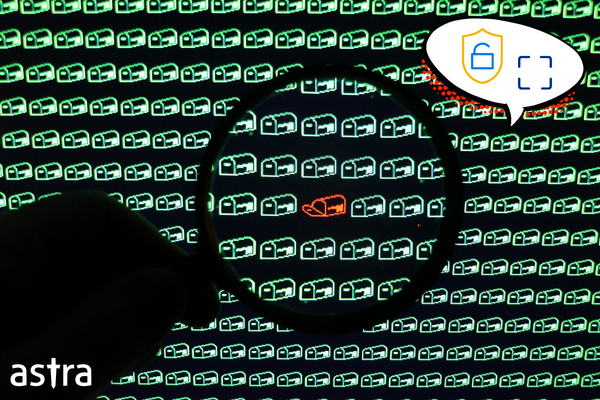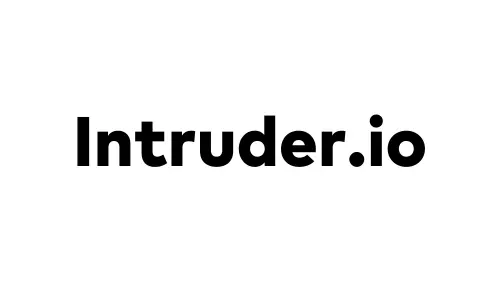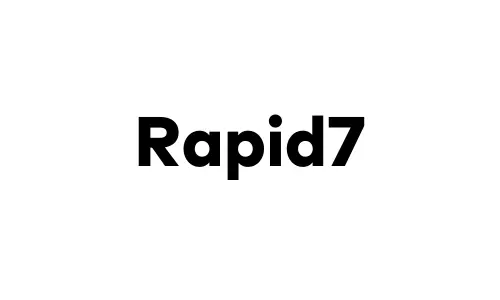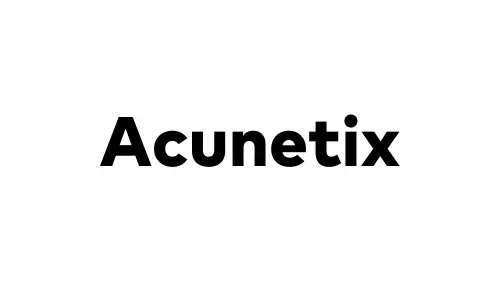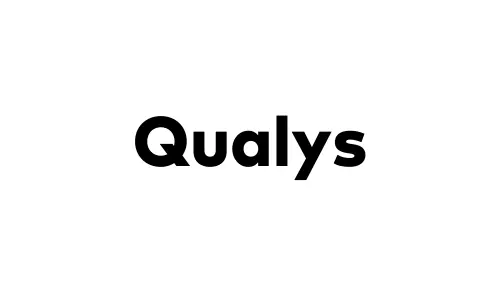A vulnerability scanner is an automated software that identifies and assesses security weaknesses in networks, applications, or computer systems. It scans for vulnerabilities like software flaws or misconfigurations and provides actionable reports to help organizations mitigate potential risks and improve their cybersecurity posture.
Read up on the best vulnerability scanners you need to consider to safeguard your assets in 2024.
Top 10 Vulnerability Scanners of 2024
- Astra Vulnerability Scanner
- Qualys
- Rapid7
- Intruder
- Nessus
- Nmap
- BurpSuite
- Probely
- AWS Inspector
- Sophos
Lastly, we elucidate the steps carried out during an extensive vulnerability scan as well as the limitations of the vulnerability scanning process.
Types of Vulnerability Scanners
1. Web Application Vulnerability Scanners
Web application vulnerability scanners scan one’s system to find vulnerabilities that could be hacked by a hacker to gain access to your website. It reveals your web application’s vulnerabilities and prevents data breaches, identity theft, financial loss, and other negative consequences.
The scan searches for different vulnerabilities such as SQL injection, cross-site scripting, and cross-site request forgery.
Why is Astra Vulnerability Scanner the Best Scanner?
- Runs 8000+ tests with weekly updated scanner rules
- Scans behind the login page
- Scan results are vetted by security experts to ensure zero false positives
- Integrates with your CI/CD tools to help you establish DevSecOps
- A dynamic vulnerability management dashboard to manage, monitor, assign, and update vulnerabilities from one place.
- Helps you stay compliant with SOC2, ISO27001, PCI-DSS, HIPAA, etc.
- Integrates with Slack and Jira for better workflow management
- Trusted by the brands you trust like Agora, Spicejet, Muthoot, Dream11, etc.

2. Network Vulnerability Scanners
Network vulnerability scanners check the security of a network to reveal any vulnerabilities that may leave the networks exposed and vulnerable to attacks. It maps out the networks, scans the network ports, and more.
This type of scanning aims to find exploitable vulnerabilities in the system that outside parties could exploit. Network vulnerability scans are performed on the network infrastructure, also known as the backbone of the network.
3. Cloud Vulnerability Scanners
Cloud vulnerability scanners analyze a cloud computing environment for vulnerabilities that hackers could exploit. Cloud vulnerability scanning is a crucial component of a cloud security strategy because it can reveal potential weaknesses in cloud security controls.
4. API Vulnerability Scanners
These vulnerability scanners identify vulnerabilities in an application programming interface (API). API vulnerability scanning scans the attack surface of an application by simulating the actions of a malicious user to identify any potential vulnerabilities that could be exploited by hackers.
5. Mobile App Vulnerability Scanners
Mobile app vulnerability scanners scan a mobile application for security vulnerabilities. The goal of vulnerability scanning mobile applications is to find weaknesses in mobile security and report them to the developers.
5. Enterprise Vulnerability Scanners
These are vulnerability scanners that are extremely scalable and ideally suited for large companies with a multitude of assets. Such tools will also offer vulnerability management services as a part of their package to ensure a hassle-free vulnerability detection and remediation experience for customers.
6. Open-Source Vulnerability Scanners
Open-source scanning software is free of cost and is perfect for new beginners and small companies alike to ensure the safety of their assets through continuous vulnerability scans.
16 Best Vulnerability Scanners In Detail
1. Astra Vulnerability Scanner

Features:
- Scanner Capabilities: Web and Mobile Applications, Cloud Infrastructure, API, and Networks
- Accuracy: Zero False Positives Assured (Vetted Scans)
- Scan Behind Logins: Yes
- Compliance: PCI-DSS, HIPAA, SOC2, and ISO 27001
- Integrations: Slack, Jira, GitHub, GitLab
- Expert Remediation: Yes
- Pricing: Starts at $199/month
Astra Security provides a world-class comprehensive vulnerability scanner with the following features:
Astra Vulnerability Scanner
Astra’s vulnerability scanner provides continuous scanning facilities with its comprehensive scanner that is capable of conducting more the 8000 tests to find any and every hidden vulnerability.
It offers deep scans for web applications, APIs, networks, mobile applications, and cloud infrastructure.
CI/CD Integrations
Astra offers CI/CD integration services for organizations. This helps companies move from DevOps To DevSecOps, thus giving more priority to security within every phase of a project’s development. It offers integrations with Slack, GitHub, and GitLab to name a few.
Compliance-specific Scans
Astra offers the option to scan for specific compliances required by your organization. It provides a compliance-specific dashboard where you can opt for the specific compliance to scan for.
Once the scan is complete the results reveal the areas of non-compliance. Compliance-specific scans provided by Astra include PCI-DSS, HIPAA, SOC2, ISO 27001, and GDPR.
Intuitive Dashboard (CXO friendly)
Astra’s vulnerability scanner boasts a CXO-friendly dashboard that is super easy to navigate. It displays the vulnerabilities as and when they are found.
Members of the development team can be added to the dashboard to collaborate with pentesters for quicker vulnerability resolution.
The dashboard also offers the option to comment under each vulnerability so that the development team can clear queries quickly.
Detailed Reports
Once the vulnerability scanning is completed a report is generated which includes the scope of testing, a list of vulnerabilities found, their details, and possible remediation measures.
It also mentions its CVSS score and Astra goes a step further by providing customers with an actionable vulnerability risk score based on which critical vulnerabilities can be prioritized.
Astra Pentest
Astra Pentest also provides hacker-style automated and manual pentests which are performed by security experts. Continuous penetration tests help identify and exploit the vulnerabilities found through vulnerability scans. This helps organizations gain an in-depth understanding of how an actual hack would affect their systems, network, and data.
Remediation Support
Once vulnerability scanning with Astra is complete Astra also provides detailed steps for remediation based on risk prioritization. This is done with the aid of POC videos and collaboration within the vulnerability dashboard.
Pros
- Can detect business logic errors and conduct scans behind logins.
- Provides rescanning upon successful remediation of vulnerabilities.
- Provides compliance-specific scans and reports.
- Ensure zero false positives through vetted scans.
Cons
- Could have more integrations.
2. Qualys
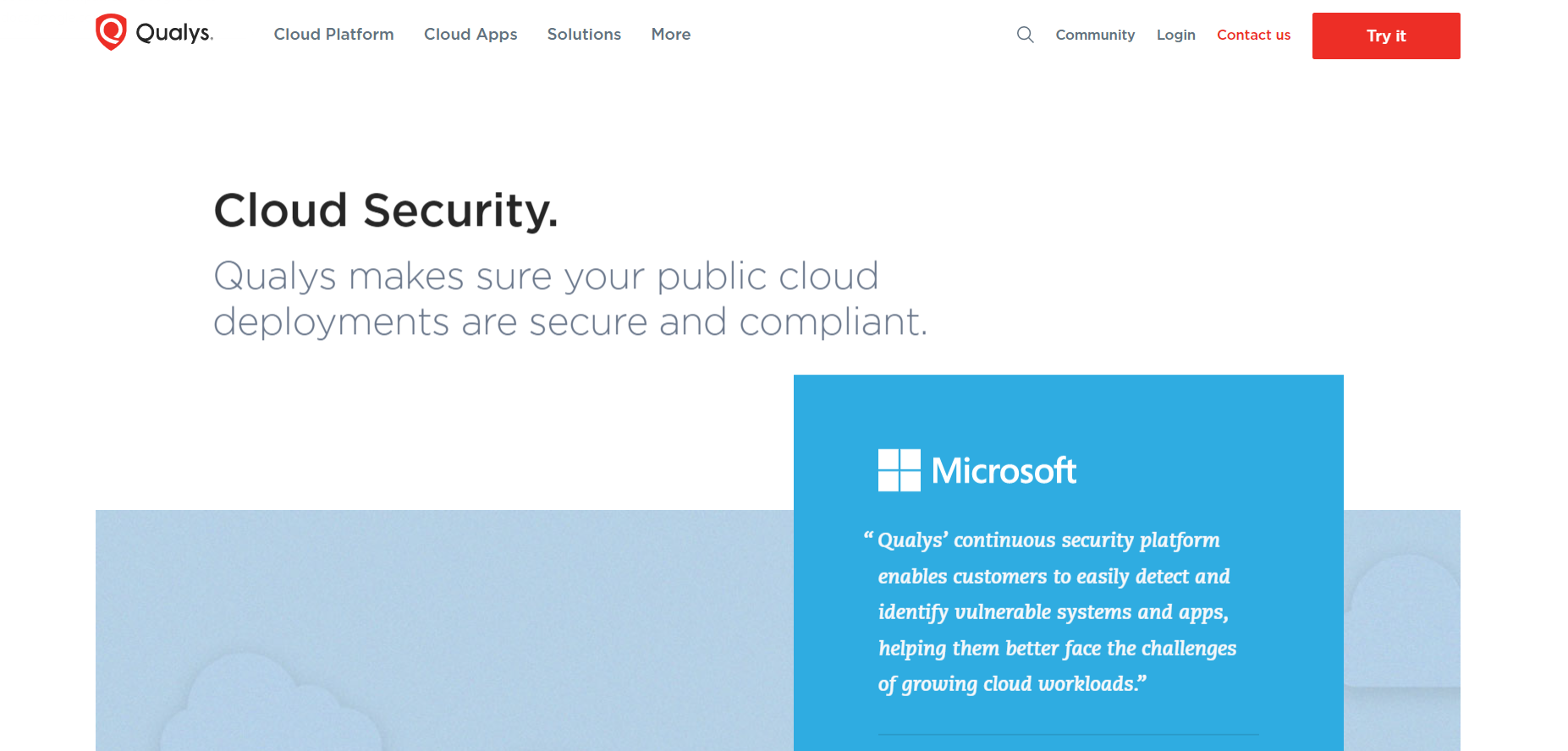
Features:
- Scanner Capabilities: Cloud, web applications
- Accuracy: False positives possible
- Scan Behind Logins: Yes
- Compliance: PCI-DSS,
- Integrations: Cisco, IBM, Splunk
- Expert Remediation: Yes
- Pricing: Quote Upon Request
Qualys is a cloud-based website vulnerability scanner platform that allows the assessment of cloud assets, vulnerabilities, and compliance status.
Qualys has a large database of known CVEs that is constantly updated. Its scalability and accuracy are some of the reasons that make this tool a popular choice.
Pros
- The highly scalable vulnerability scanning solution
- Provides vulnerability management, detection, and response.
- Accurate reporting that is easy to follow.
Cons
- Can be slow when scanning.
- Difficult to navigate for beginners.
- Slightly on the expensive end.
- No zero false positive assurance.
3. Rapid7
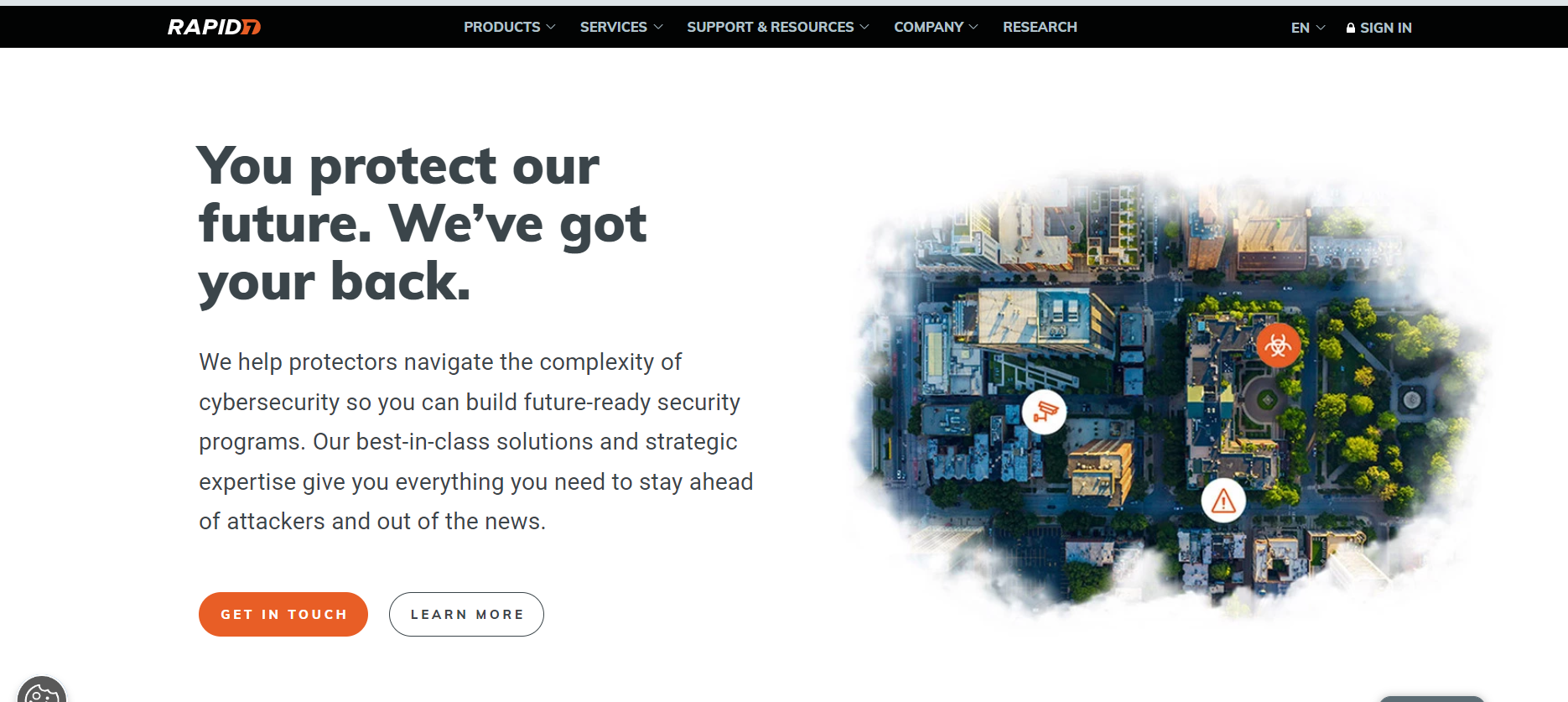
Features:
- Scanner Capabilities: Cloud and Web Applications
- Accuracy: False Positives Possible
- Scan Behind Logins: No
- Compliance: CIS, ISO 27001
- Integrations: Splunk, AWS, Microsoft
- Expert Remediation: No
- Pricing: $175/month
Rapid7 is also an vulnerability scanning tool that provides vulnerability testing, risk management, and threat intelligence.
Their vulnerability scanner software also helps achieve compliance with various regulatory standards through their vulnerability assessments.
Other services include detection and response for threats.
Pros
- Great scanning abilities that help meet compliance requirements.
- Their services are easy to use and deploy.
- The services are scalable based on customer requirements.
Cons
- Scanned devices can only be removed manually.
- Inadequate customer satisfaction.
4. Intruder
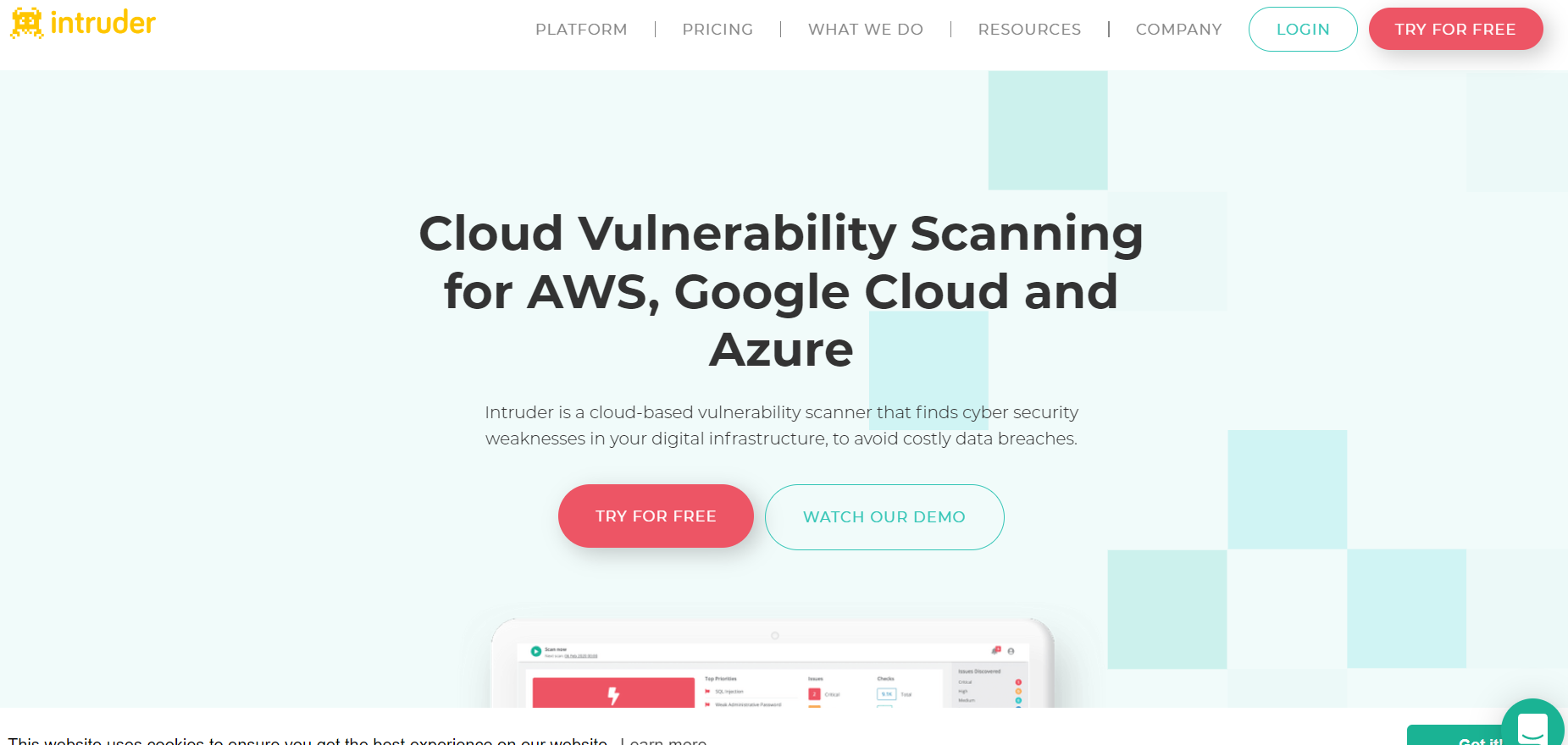
Features:
- Scanner Capabilities: Websites, servers, and cloud.
- Accuracy: False Positive Present
- Scan Behind Logins: Yes
- Compliance: SOC2, and ISO 27001
- Integrations: GitHub, GitLab, Slack, Jira
- Expert Remediation: No
- Pricing:$1,958/ year
Intruder is a top-notch online vulnerability scanner that helps avoid costly data leaks and breaches through vulnerability scanning.
It offers continuous vulnerability management, compliance reporting, and monitoring as well as attack surface monitoring.
Intruder is a scalable solution that’s flexible enough to scan websites for vulnerabilities, no matter the size or the industry your company belongs to.
Pros
- Continuously monitors attack surfaces for any chinks in security.
- Provides comprehensive security checks to find vulnerabilities like misconfigurations, injections, OWASP Top 10, and more.
- Automated scanning with real-time alerts for exposed ports and other services.
Cons
- Could have better integrations.
- Confusing interface.
- Zero false positives are not assured.
5. Nessus
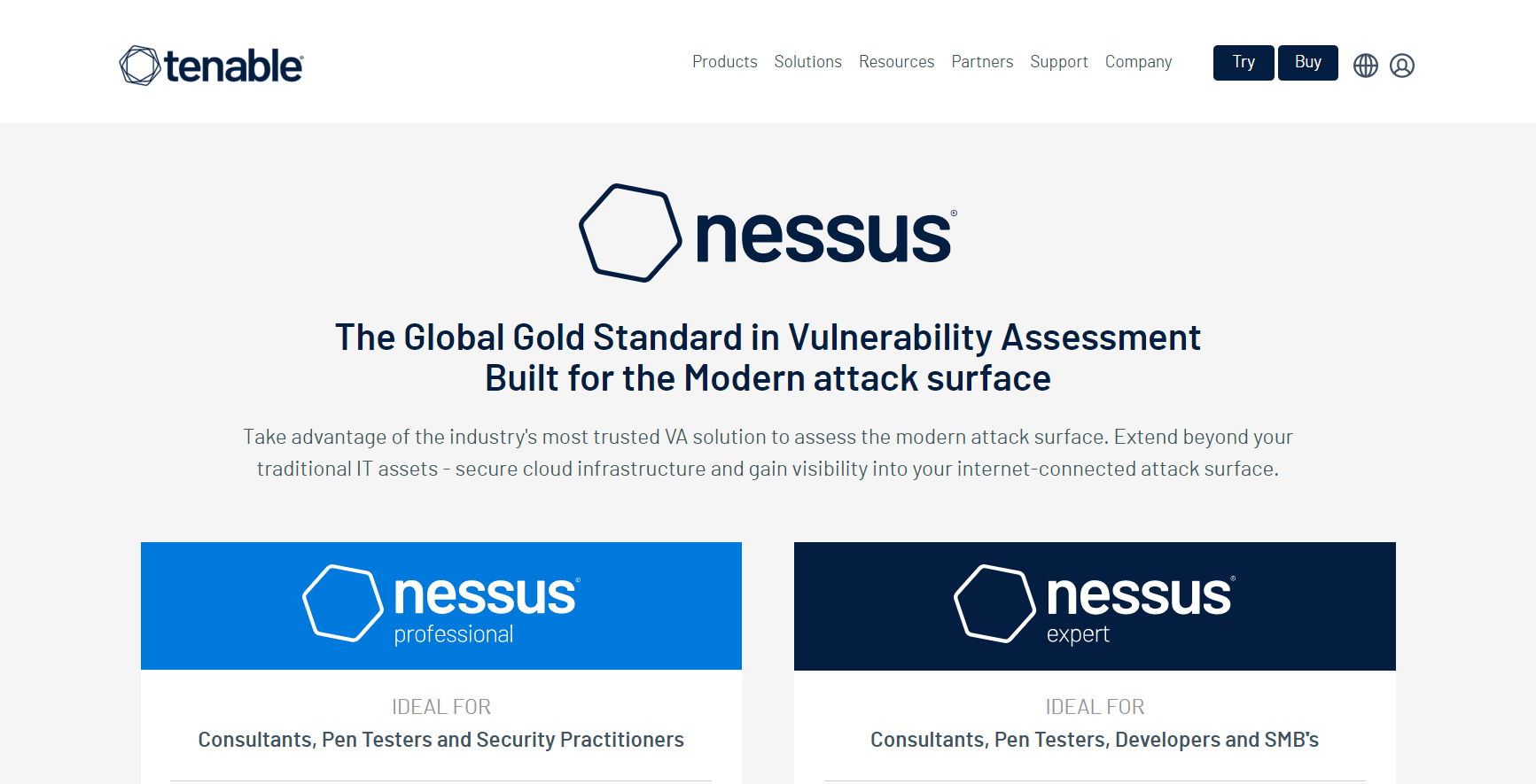
Features:
- Scanner Capabilities: web applications
- Accuracy: False positives possible
- Scan Behind Logins: No
- Compliance: HIPAA, ISO, NIST, PCI-DSS
- Integrations: AWS, Microsoft, Splunk
- Expert Remediation: Yes (Additional Cost)
- Pricing: $5,880.20/ year
Nessus is one of the best web vulnerability scanning tools released by Tenable. It helps with point-in-time analysis of security systems to find vulnerabilities that may be plaguing them.
They also provide a detailed reporting feature that details the vulnerabilities found and the appropriate patches for them.
Nessus is a scalable enterprise vulnerability scanner that is ideal for achieving compliance.
Pros
- Helps find missing patches that are critical to maintaining security.
- Point-in-time analysis of security system.
- Helps achieve compliance with the scans.
Cons
- Advanced support is only available upon additional payment.
- Takes time to complete scans.
- Can be an expensive solution.
6. Nmap

Features:
- Scanner Capabilities: Network scanning
- Accuracy: False positives possible
- Scan Behind Logins: No
- Compliance: No
- Integrations: No
- Expert Remediation: No
- Pricing: Open Source
Nmap is an open-source network vulnerability scanner that helps with cloud network discovery, management, and monitoring.
It is designed to scan large cloud networks, however, it also works fine against singlet networks.
The tool can be used for port scanning, network mapping, service detection and firewall evasions.
Pros
- Shows open ports, running serves, and other critical facets of a network
- Freely available.
- Usable for large and small networks alike
Cons
- The user interface can be improved.
- Might show different results each time.
7. BurpSuite
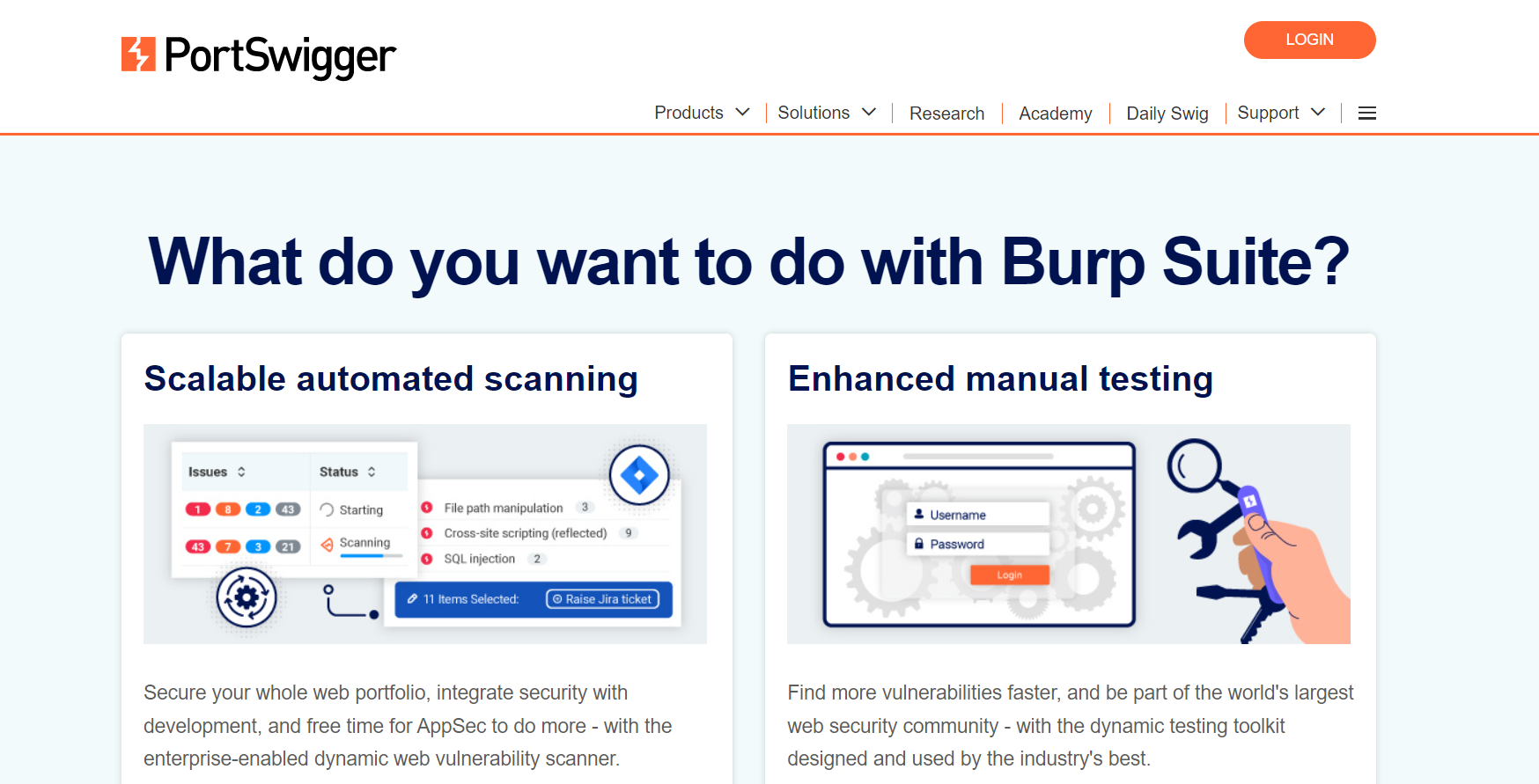
Features:
- Scanner Capabilities: Web application scanning
- Accuracy: False positives possible
- Scan Behind Logins: Yes
- Compliance: PCI-DSS, OWASP Top 10, HIPAA, GDPR
- Integrations: Jenkins, TeamCity
- Expert Remediation: Yes
- Pricing: $3,999/ year
BurpSuite is a constantly evolving vulnerability scanning tool that provides integrations for easy ticket generation.
Now, it also provides scope for testing out cloud environments and testing for misconfigurations in S3 buckets.
Burp Suite’s automated scanning option ensures that web assets are secured thoroughly through optimal continuous scanning which can be scaled according to one’s needs.
Pros
- Provides advanced automated pentesting services.
- Provides step-by-step advice for every vulnerability found.
- Can crawl through complex targets with ease based on URLs and content.
Cons
- Advanced solutions are commercialized and can be expensive.
- Does not provide expert customer service and assistance.
8. Probely

Features:
- Scanner Capabilities: Web application and API scanning
- Accuracy: False positives possible
- Scan Behind Logins: Yes
- Compliance: PCI-DSS, GDPR, ISO-27001, HIPAA
- Integrations: Microsoft Azure, Jira, Slack
- Expert Remediation: Yes
- Pricing: $4788/year
Probely’s web vulnerability scanner allows the easy testing of security for web applications and APIs. It provides thorough reports that are easy to follow.
The tool comes with an unlimited number of vulnerability scans and provides detailed reports with risk scores.
The tool and its services are ideal for developers, security teams, and for DevOps.
Pros
- Simple to use with continuous scanning.
- Wide range of tests.
- Good customer support.
Cons
- Could have better integrations.
9. AWS Inspector
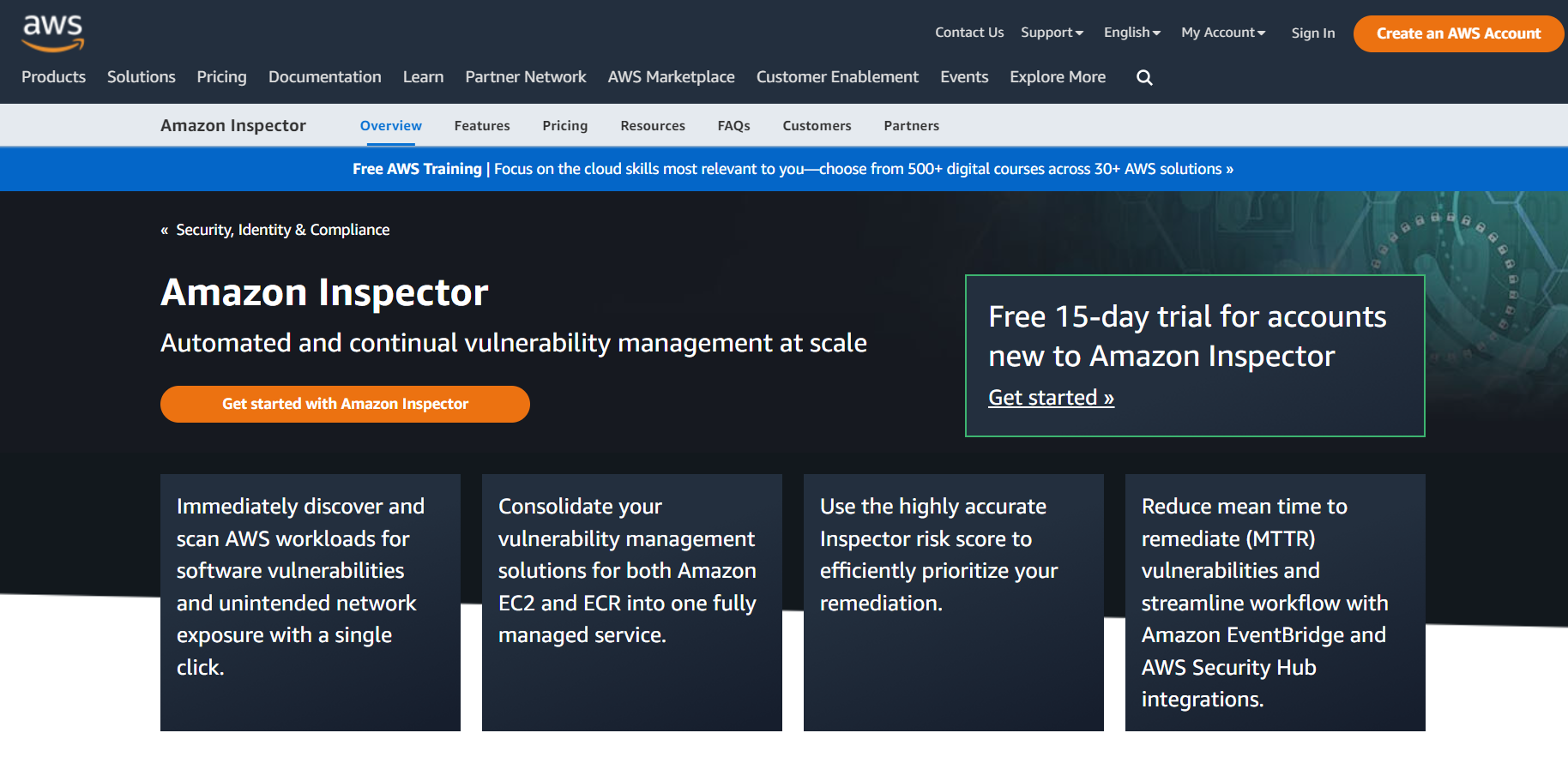
Features:
- Scanner Capabilities: Amazon Web Services Workloads
- Accuracy: False positives possible
- Scan Behind Logins: No
- Compliance: SOC, PCI-DSS, HIPAA
- Integrations: AWS Security Hub, Amazon ECR
- Expert Remediation: No
- Pricing: Quote upon request
This automated AWS vulnerability scanner and management service helps by performing continuous scans of the automatically detected AWS workloads for vulnerabilities and unintentional exposures.
A free trial is provided for 15 days after which the pricing quote has to be requested.
After a few easy steps to enable its services, AWS Inspector can be used across all your AWS accounts.
Pros
- Discovers EC2 instances and images.
- Assess the plastic container registry for flaws and areas of exposure.
- Contextualized risk scores
Cons
- Does not provide the classification of individual findings.
- Billing can be a bit tricky
10. Sophos

Features:
- Scanner Capabilities: Web, Mobile, Cloud, Network and API scanning
- Accuracy: False positives possible
- Scan Behind Logins: No
- Compliance: PCI-DSS, HIPAA, GDPR
- Integrations: Splunk, Slack, Jira, Jenkins, BitBucket
- Expert Remediation: Yes
- Pricing: Quote upon request
Established in 1985 Sophos Cloud offers simplified enterprise-level solutions for cloud security including vulnerability scanner solutions, 24/7 cloud threat detection and response, native protection, and security automation for DevOps.
These services are typically offered as part of Sophos’ larger suite of cybersecurity solutions, which also include endpoint protection, email security, and network security.
Pros
- Available for AWS, GCP, and Azure.
- Helps with security automation through DAST, SAST, and SCA code analysis.
- Intuitive user-friendly dashboard.
Cons
- It can be expensive.
- Difficult to set up.
- Customer support could be better.
11. Acunetix
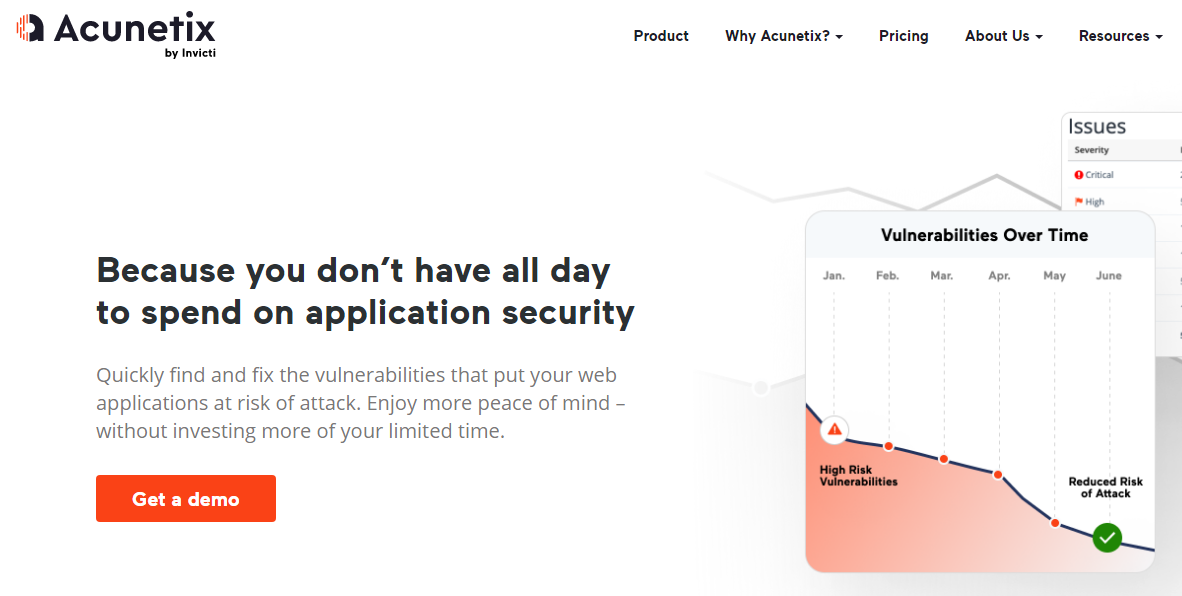
Features:
- Scanner Capabilities: Web applications
- Accuracy: False positives possible
- Scan Behind Logins: Yes
- Compliance: OWASP, ISO 27001, PCI-DSS, NIST
- Integrations: Azure, Jira, GitHub
- Expert Remediation: Yes
- Pricing: $4,495/website
This is a vulnerability scanner that was designed for efficiency promising 90% security scan results by the time the scan is halfway completed.
It also allows the scanning of multiple environments as well as the prioritization of vulnerabilities.
Its key features include the ability to pinpoint vulnerability locations, and optimization for script-heavy sites among others.
Pros
- Time release of updates
- Can find a wide array of vulnerabilities.
- Agile testing with detailed reports
Cons
- Does not provide expert remediation assistance with professionals.
- Does not ensure zero false positives.
- Pricing is not mentioned.
- Dated user interface with scope for improvement.
12. Cobalt
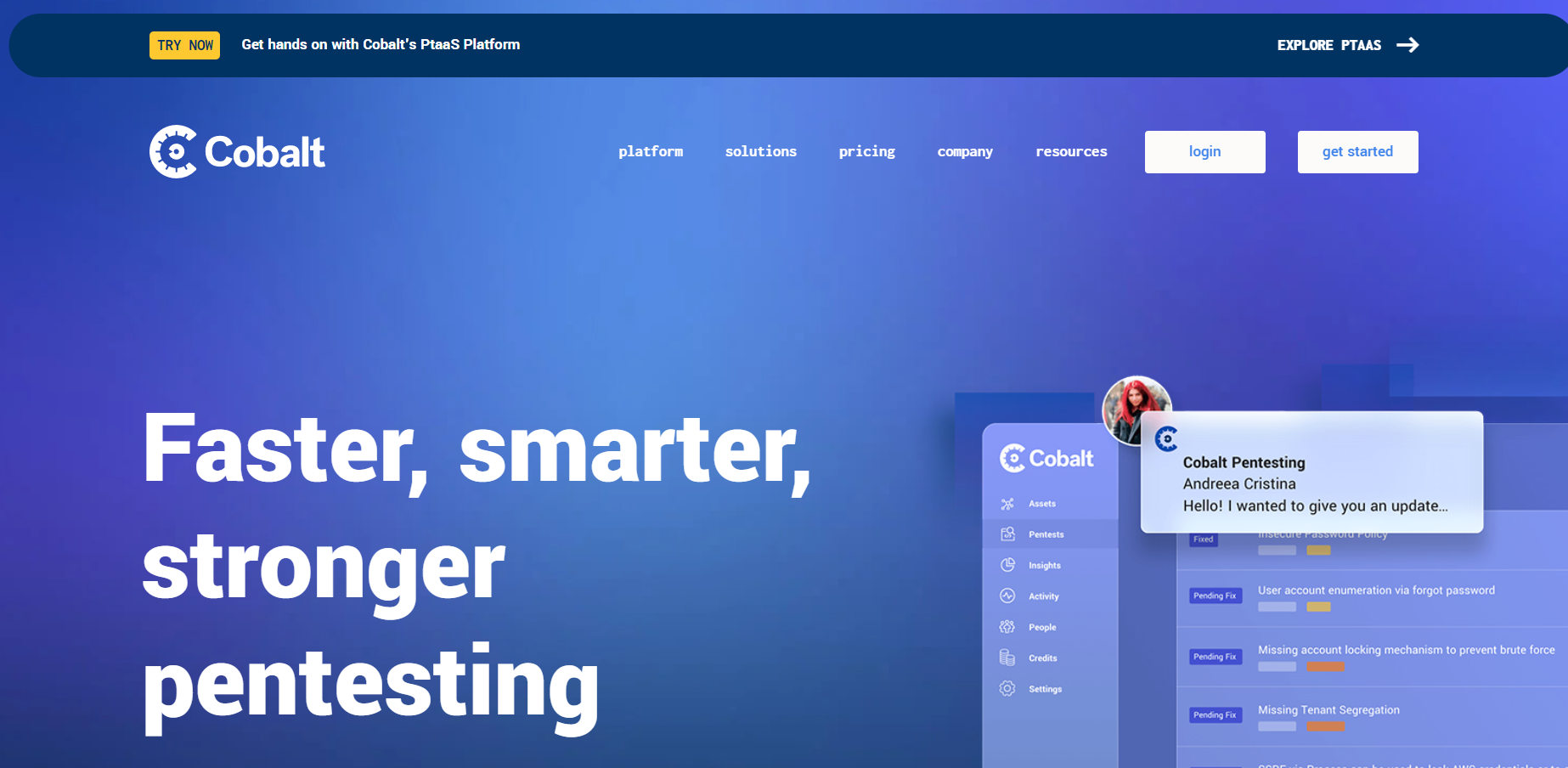
Features:
- Scanner Capabilities: Web and mobile applications, APIs, Networks, and Cloud.
- Accuracy: False positives possible
- Scan Behind Logins: No
- Compliance: SOC2, PCI-DSS, HIPAA, CREST
- Integrations: GitHub, Jira, Slack
- Expert Remediation: Yes
- Pricing: $ 1650/Credit (8 pentesting hours)
This cloud-based vulnerability assessment scanning tool is automated and generally availed for web applications. It provides management service for an organization’s infrastructure.
Cobalt’s SaaS platform helps you gather real-time insights so that your teams can get on with the remediation quickly. It helps you with cloud scanning and other forms of pentesting.
Pros
- Impressive existing clientele including Nissan and Vodafone.
- 14- day trial period.
- Accelerated find to fix cycles
Cons
- The retest often takes too much time
- Complex pricing structure
- Reported false positives
13. Wireshark
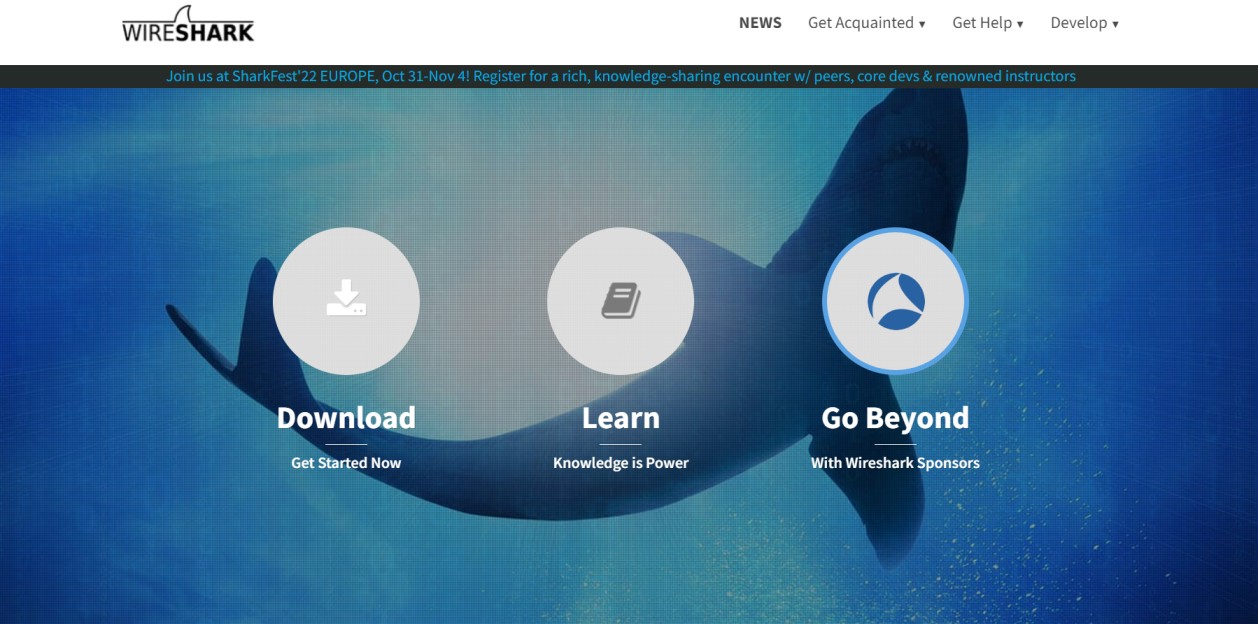
Features:
- Scanner Capabilities: Network packet analyzer
- Accuracy: False positives possible
- Scan Behind Logins: No
- Compliance: No
- Integrations: GitLab
- Expert Remediation: No
- Pricing: Free
Wireshark is a prominent freely available network packet analyzer that’s made use of by a large population of security testers.
It offers live monitoring and offline capturing while running on different platforms like Windows, Linux, and more.
It is prominently used for network monitoring, troubleshooting, and protocol development.
Pros
- Easy to install
- Freely available
Cons
- Can be difficult for beginners to navigate.
- Could improve its user interface.
- Does not readily detect and report intrusions found.
14. Veracode
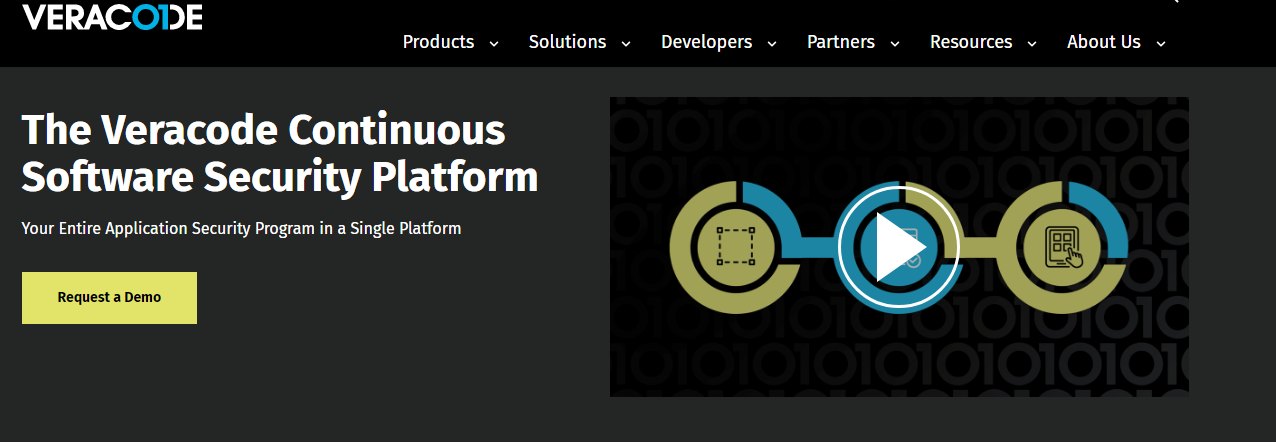
Features:
- Scanner Capabilities: Web applications
- Accuracy: False positives possible
- Scan Behind Logins: Yes
- Compliance: NIST, PCI, OWASP, HIPAA, GDPR
- Integrations: Jira, BitBucket, Maven
- Expert Remediation: Yes
- Pricing: Quote upon request
Another most-popular tool for vulnerability scanning is Veracode. Veracode is a dynamic solution that helps in the analysis of web applications to find vulnerabilities.
Other services offered by them include software composition analysis, DAST, SAST, and penetration testing.
The services offered by this tool along with its remediation guidance help customers meet compliance requirements, achieve DevOps, and more.
Pros
- Offers DAST, SAST, and penetration testing services.
- Provides detailed and comprehensive reports.
- Provides automated remediation assistance.
Cons
- Zero false positives are not assured.
- Could improve its user interface
- Can be difficult for beginners.
15. Invicti
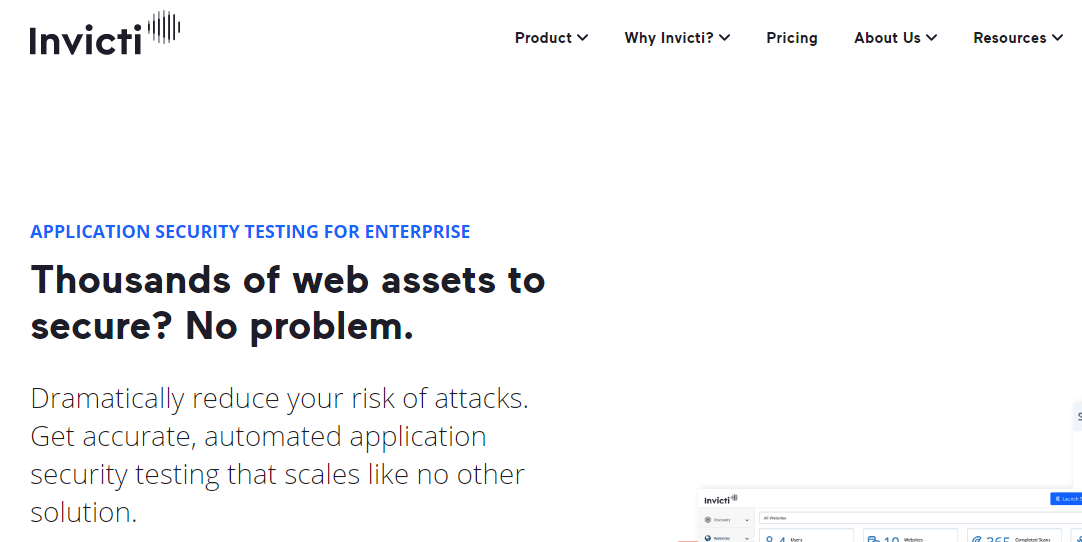
Features:
- Scanner Capabilities: Web applications and APIs
- Accuracy: False Positives Possible
- Scan Behind Logins: No
- Compliance: PCI-DSS, HIPAA, OWASP, ISO 27001
- Integrations: GitHub, BitBucket, Jira, Kenna
- Expert Remediation: Yes
- Pricing: Quote upon request
Invicti is a powerful, highly accurate, automated web app vulnerability scanner. It is the de-facto standard for detecting, locating, and reporting application security risks.
Invicti or as it was previously known as Netsparker can be used to scan any web application regardless of the technology stack or development framework used.
It is used by developers, auditors, and security professionals to improve the security of web applications.
Pros:
- Lot of options to select security policies from
- IAST enabled scans
Cons:
- No support for 2FA and MFA apps
- Slows down while scanning large applications
16. Indusface WAS
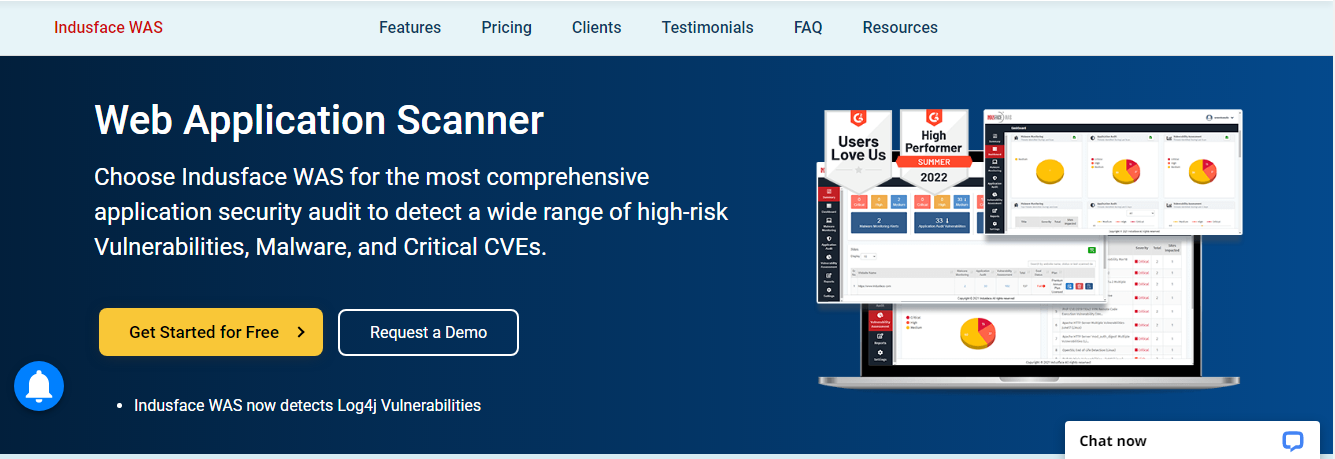
Features:
- Scanner Capabilities: Web and mobile applications, APIs
- Accuracy: Zero false positives
- Scan Behind Logins: Yes
- Compliance: PCI-DSS, ISO 27001
- Integrations: Splunk, IBM, Imperva
- Expert Remediation: Yes
- Pricing: $ 199/app/month – yearly
Indusface combines automated scanning and manual pentesting to help you detect all OWASP top 10 vulnerabilities, and business logic errors and also promises zero false positives, and provides remediation assistance.
The scanner built by Indusface is focused on scanning single-page applications and they offer intelligent crawling.
Pros
- Assured zero false positives through zero-day protection.
- Helps achieve compliance with regulations like PCI-DSS and ISO 27001.
- Vulnerability detection is not limited to OWASP Top 10.
- It has an executive dashboard that provides necessary information.
Cons
- Reports are difficult to understand.
How To Choose The Best Vulnerability Scanner?
Here are the detailed factors to take into consideration when choosing the best vulnerability scanners.
1. Cost
Choosing according to the budget set you for your organization’s online security needs. The companies that you’re shortlisting should have the flexibility of setting a quote customized to your needs and or must have budget-friendly packages that are precise for your company size.
2. Features
Analyze the features offered by each tool in your consideration to see which comes out as the winner. Some features to look for include:
- Accurate Vulnerability Detection: It should be able to test and assess various types of assets for a wide range of vulnerabilities precisely. These assets could be web or mobile apps, to APIs, networks, and the cloud infrastructure.
- Continuous Scanning: The tool should continuously monitor and scan assets to find any hidden or new vulnerabilities that could have risen.
- Vulnerability Management: Ensure that the vulnerability scanning provider does not leave you high and dry but rather has a vulnerability management function that deals with the detection and remediation of flaws.
- Scalability: The tool should be scalable in terms of the assets that need to be scanned.
3. Compliance
What are the compliances catered for by the tools within your consideration? Do they provide compliance-specific scans with tailor-made compliance reports based on the compliance you want to test for? Compliances like PCI-DSS, HIPAA, SOC2, GDPR, and ISO 27001 are some of the most important ones to keep in mind.
4. Customer Support
Make sure that customer support provided by the vulnerability scanning provider in question is good with a quick query clearance rate. Check up on customer reviews and gain a better understanding of the customer support provided by the companies.
5. Integrations
Can the tool be integrated with your CI/CD pipeline? This is crucial in the present-day scenario where due importance is being given to security in the online platform. Thus ensure that the tool you opt for can be integrated with your projects on different platforms.
6. Detailed Reports
Ensure that tool provides a well-detailed report with CVSS-based risk scores explaining and summarizing the finding of the vulnerability scan based on the scope set by you and your scanning partner.
Check out some of the sample reports provided by the companies on your shortlist to see which one is more detailed and goal-oriented and choose accordingly.
Limitations of Vulnerability Scanners
Limitations of vulnerability scanners vary based on the features provided but in general, there are certain limitations for both pain and open-source vulnerability scanners.
Limitations of Paid Vulnerability Scanners
- Not Extensive
A vulnerability scan can only detect the vulnerabilities but it does not provide an in-depth analysis of the damage that could be caused by it if the vulnerability was made used to gain entry by a malicious hacker.
- Unclear Implications
Each vulnerability when exploited can expose different areas of your organization. A vulnerability scan cannot generally give a thorough understanding of the implication that a vulnerability has on your security system.
3. Cost
Small businesses will find the costs of securing their websites with the aid of a commercial tool highly expensive. This is less applicable to medium and large enterprises.
Limitations of Open-Source Vulnerability Scanners
- False Positives
Vulnerability scans can also result in false positives which in turn results in organizations spending time and money to fix vulnerabilities based on a glitch.
- Limited Features
When it comes to the extensivity offered by a commercial vulnerability scanner, open-source tools fall short or rather will not have a great effect in terms of vulnerability detection.
- Limited Updates
Most of the open-source vulnerability scanners have vulnerability databases that are not constantly updated meaning there it wouldn’t be able to detect newer vulnerabilities in assets.
- Not scalable
Open-source vulnerability scanners are great for small companies and their assets. However, for large enterprises, the task of using an open-source tool can be tedious and cumbersome in terms of features, speed, and support.
- No customer support
Although open-source vulnerability scanners are privy to large communities of dedicated cybersecurity experts, they do not have dedicated teams who can help you resolve queries and aid in remediation.
Conclusion
This article has detailed the 16 best vulnerability scanners with Astra Pentest as the top contender, and their features, pros, and cons. Along with this, we have also detailed various factors to consider when choosing the web vulnerability scanner or the best cloud application vulnerability scanner.
These along with the steps in vulnerability scanning are aimed at helping you arrive at the best vulnerability scanning solution for your needs!
FAQs
What can vulnerability scanners not do?
A vulnerability scanner provides an in-depth view of the impact of a vulnerability if it is exploited. Another issue with vulnerability scans is that it raises false positives which can result in companies spending time and money to fix vulnerabilities that didn’t exist.
What are the advantages of vulnerability scanners?
Vulnerability scanners can help companies assess their security systems in a budget-friendly manner with continuous monitoring and fast results.
How does a vulnerability scanner detect threats?
Vulnerability scanners have a vulnerability database with all-known CVEs to which the vulnerabilities detected be matched for correct identification.
